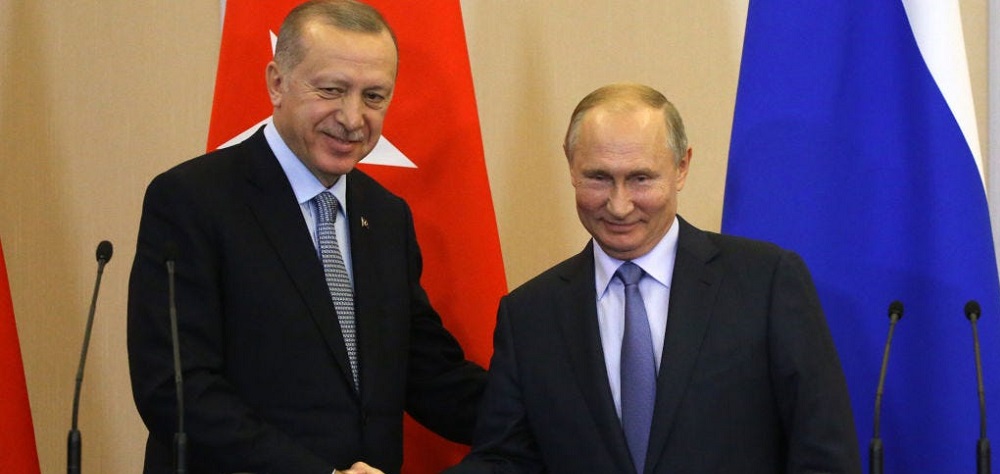Alwaght- As the five-day ceasefire in northeast Syria ended, Russia and Turkey announced they reached an agreement to end the Turkish military operation against the Syrian Kurds as Turkey’s President Recep Tayyip Erdogan met his Russian counterpart Vladimir Putin on Tuesday in the Russian resort city of Sochi.
The two leaders said there will not be a resumption of the Turkish operation, dubbed Peace Spring, and the truce will endure. This primarily exhibits the Turkish content with the outcome.
On the other side, the Kurdish militias and the Syrian government continue their cooperation, as an earlier agreement proposed, to pave the way for Damascus forces to deploy to the northeastern regions the Kurds controlled uncontested until earlier this month.
The rising atmosphere gives rise to a question: How will the Syrian development go after the new accord?
Russia takes the initiative
One of the key ramifications of the deal is the full US exit from the equations of determination of the Syrian war course and the official advent of Russia as the unchallenged player in the Syrian future. Turkey showed that despite staying in contact with the US, and also making some temporary agreements with the Americans, the ultimate deals are struck with the Russians.
The dwindling of the US credibility is its mistake. It proved its untrustworthiness when it betrayed the Syrian Kurds and left them alone in the face of Turkey and also when deceived Turkey about its troops' withdrawal. A couple of hours after Pence announced an agreement with Erdogan, Trump said part of his troops will remain in Syria to help Kurdish allies continue their grip on the oilfields in the north.
With all certainty, it can be said that the main loser of this Russian-Turkish geopolitical deal is the US. A short time after it was announced, Russian Defense Minister Sergey Shoygu said it is time for the US to leave Syria.
The new agreement has a message to the Kurds: they have a new protector and guarantor. After the US, with its abrupt withdrawal from areas where it was jointly operating with the Kurdish forces, left the Kurds alone in an unequal war with the Turkish military, Russia won their focus as a new ally worthy of trust as it showed with its ally President Bashar al-Assad of Syria.
Privileges to Damascus
Although the Syrian government has always disparaged Turkey for its intervention and called it an occupying force, the new agreement gives it non-negligible privileges. On the one hand, Russia will manage to push one of the strictest opponents of Damascus government towards recognizing the legitimacy of the Assad presidency and contingent dialogue for the normalization of ties. Over the past few days, Ankara said it established channels with the Syrian government for “necessary military coordination.” The deal, many analysts agree, leaves Ankara with no justification to avoid recognizing President Assad. Aaron Stein, director of Middle East program at the Philadelphia Foreign Policy Research Institute, told the Washington Post: “Erdogan, who has been one of Assad’s most vocal adversaries during Syria’s war, would have to prepare Turkey’s public for such recognition. He has already begun to do that.”
Prevention of the ISIS terrorist group’s resurgence is another privilege to the Syrian government offered by the deal. One provision of the deal states that two countries, Russia and Turkey, will mobilize efforts to prevent penetration of terrorists into Syria. Reports suggest that 11,000 terrorists, mainly from ISIS, are held in the northern Syria prisons. Turkish operation could set them free and cause new challenges to the Syrian government. From another aspect, a large number of terrorists, mainly affiliated with Al-Nusra Front, are taking shelter in Idlib as the last major stronghold of them. The deal will strip them of Ankara's support and allow the Syrian government to liberate Idlib from them.
Following the agreement, president Assad told Putin Syria will continue the battle against terrorism and will retake every inch of the occupied territories by all legal means available to it.
An emphasis on Syria sovereignty is another outcome for Damascus. Even though Erdogan and his military commanders say they have no intention to stay forever in Syria, the Syrian leaders doubt their honesty and raise concerns about the occupation of territories by Turkey. In the recent accord, Turkey reiterated recognition of the Syrian sovereignty.
Under the initiative, Moscow and Damascus will oversee the Turkish-eyed safe zone that is hundreds of miles long and 20 miles deep into Syria’s north. This facilitates the return of the Syrian military to regions Damascus forces could not enter due to the American presence.
Ambiguities of agreement for Kurds
Certainly, a stop to the Turkish attacks is an important achievement of this deal. But the Kurds’ concerns, including the Turkish intention to settle Arab refugees in the safe zone that will lead to demographic changes in the north, will linger.
On the one hand, Erdogan’s intent for a demographic change is clear. On the other hand, the emphasis on the “voluntary return of the refugees” may end up tying the hands of Erdogan for the plan. The Kurds are yet to issue their official stance on the agreement. Kemal Akef, the spokesman to the Kurdish Autonomous Administration of North and East Syria, also dubbed Rojava, told the Kurdish Hawar News that the Administration will soon state its position on the agreement.



























